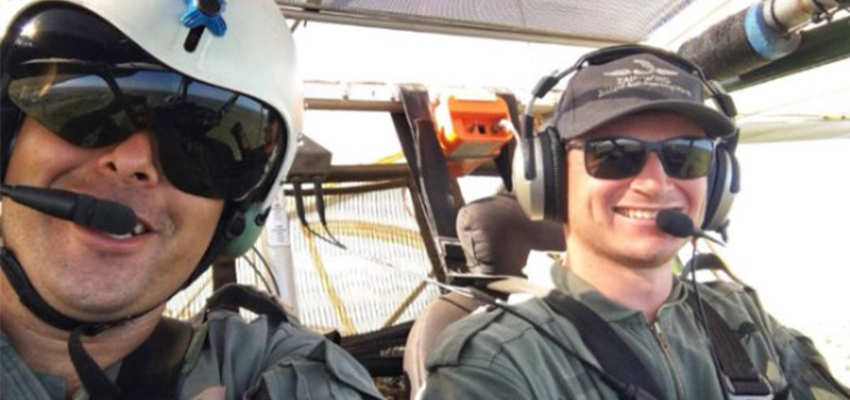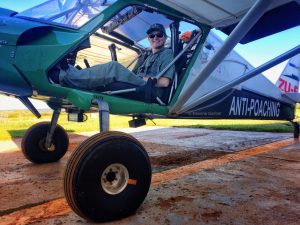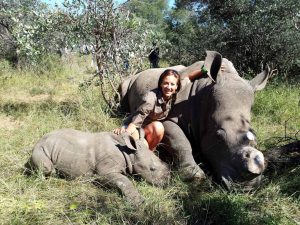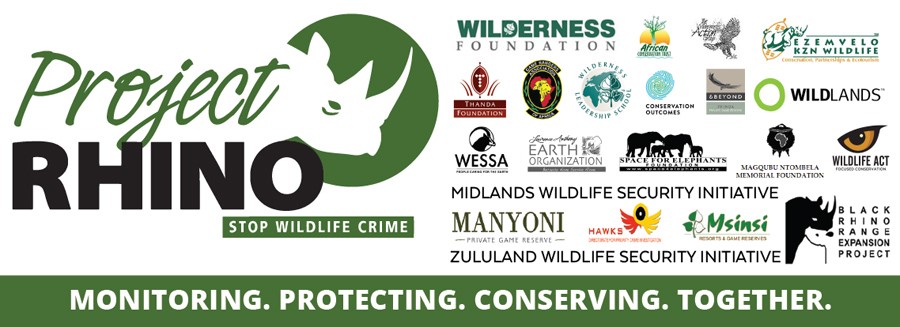Project Rhino has another exciting year ahead as we work together in support of our member reserves in anti-poaching and the protection of our wildlife.
2018 has already seen some changes, as we say a sad farewell to our ZAP Wing bush pilot Etienne Gerber after 7 years in the field. “A dedicated and passionate individual who has been a vital member of our team in watching over our wildlife from the sky. We wish him all the best as he takes on his new role as an anti-poaching helicopter pilot.” Francois du Toit, CEO of African Conservation Trust.
“2017 has not been an easy year, with the onslaught on our reserves ever increasing, but the successes that we do achieve motivates us to continue with renewed energy. To all our supporters I would like to express our appreciation for your support throughout these past years.” Etienne Gerber.
In his place, we want to extend a very warm welcome to Ian Waghorn who will be taking over as the ZAP Wing pilot for Project Rhino. Ian started his training with his father at the young age of 13 and now has over 1300 hours under his belt. With a passion for the bush and back country flying, Ian will be a great member of the team.
We also want to extend a warm welcome to Carlien Esterhuizen, who has taken over as Project Rhino Administrator from Georgie Hancock. A big congratulations to Georgie, who was recently accepted into the Andbeyond team as a field guide after completing her Zinkwazi training at Phinda. Carlien Esterhuizen has come with many years of conservation experience after working in the bush for 16 years as a wildlife conservation manager, field ecologist and in the hospitality industry.
We are really fortunate to have Ian and Carlien join us, bringing their experience and additional skill sets to support and grow the work of Project Rhino.’ Chris Galliers.
The Project Rhino Annual Report 2017
ZAP- Wing:
The Project Rhino Zap-Wing Unit had a successful year with 118 flights performed, 246 hours flown, 18 000km distance flown and a total area of 500 000ha covered over 13 reserves. One arrest was made, over 40 snares were detected, 4 rhino carcasses were detected, and one injured rhino was found with a bullet wound and successfully treated. Several reactions and operations took places and were all performed in conjunction with the SAPS and private and state conservation units.
Ranger Support
Project Rhino also put a lot of effort and energy into ranger support as rangers and anti-poaching teams are the last line of defence in the escalating rhino poaching conflict in KwaZulu-Natal, as well as other mounting wildlife crime issues. During 2017 Project Rhino directly supported and trained over 50 rangers and game reserve managers from 12 private, state and community-owned game reserves through our partnerships with Game Rangers Association of Africa (GRAA) and the Southern African Wildlife College. Courses conducted were in the form of Counter insurgency tracking training (CITT), First Aid Training, Advanced weapons handling training and night operations training.
K9 Unit
Project Rhino successfully launched the first phase of our K9 Anti-poaching dog unit in November 2017 to assist reserves in stopping wildlife crime. This unit was put to work in Zululand, locating a number of carcasses of critically endangered white-backed vultures. Within its first 3 weeks, the Project Rhino K9 Unit was present at SAPS road blocks, reserve vehicle checks and night patrols. Dogs have proved to be an essential tool to fight wildlife crime by tracking down poachers, detecting wildlife products and recovering illegal weapons and ammunition.
Dehorning
In 2017 Project Rhino made a national and international call for funding to have approximately 200 rhino de-horned in KwaZulu-Natal. De-horning is seen as a temporary measure to prevent the killing of a rhino for its horn by poachers. It is an ongoing process, as the horn regrows after removal. The de-horning intervention has achieved positive results over the last two years since it was initiated in many of the private reserves in KZN. For five years since 2011, the rhinos poached on private reserves made up 24% of the total lost in the provinces. Since dehorning started, this number has dropped to an average of 4.5% over the past 2 years.
Rhino Art
Project Rhinos Rhino art youth engagement project reached 179 schools and 82 284 children in 2017, educating the youth on wildlife crime and the protection of our natural heritage. Three kids’ camps were held, with 93 children attending these camps. It is one of the goals to let the youth from varied backgrounds interact in nature and immerse themselves in a possible life changing career guidance option. It is also important for the children to see live rhino in the wild and experience the sheer enormity of the animal we are all trying to save.
Community support
Project Rhino has always recognised the value that communities play and can play in reducing wildlife crimes such as rhino poaching. Community engagements have been varied, but based on the simple point that it is very difficult for people to support or value something that they do not know. Project Rhino initiated a weekend where 20 leaders from the KwaJobe community were able to spend 2-nights in Mkuze Game Reserve. As a community that border the reserve, only half of the leaders had been into the reserve, but only to attend meetings. They had never spent enough time to understand how the park functions and what it has to offer. A full program was in place for all to learn and experience as much as possible over the 2-days.
Our 2017 Annual ReportClick here for the full online report for 2017 |





